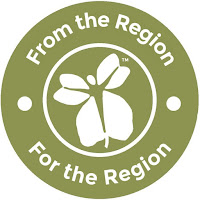POSITIVE PURCHASING WORKSHOP - Robin De Roubaix
 On Thursday the 29th of July, the Rhino Convention Centre hosted a Positive Purchasing workshop as a part of the fRfR (From the Region, For the Region) campaign. The fRfR campaign is collaboratively driven by the Kruger-to-Canyon Biosphere (K2C) non-profit company, Activating Africa and other partners, funded by the Government of Flanders. Its aim is to stimulate intra-regional trade towards greater economic and environmental sustainability in this very special bio-region.
On Thursday the 29th of July, the Rhino Convention Centre hosted a Positive Purchasing workshop as a part of the fRfR (From the Region, For the Region) campaign. The fRfR campaign is collaboratively driven by the Kruger-to-Canyon Biosphere (K2C) non-profit company, Activating Africa and other partners, funded by the Government of Flanders. Its aim is to stimulate intra-regional trade towards greater economic and environmental sustainability in this very special bio-region.
Positive Purchasing, in the context of this workshop, is when regional retailers, restaurants and lodges opt to buy their products and services from locally based suppliers. This focus, when effectively managed, holds immense potential for the economic empowerment of local businesses, farmers and service SMMEs according to a study that was part-funded by the Flanders Government and led to the establishment of the campaign. The fRfR campaign, and this workshop, is a discussion around the issues, solutions and implementation of strategies to integrate the regional supply chain.
Facilitated by Candice Grover (Activating Africa), the workshop introduced the various stakeholders to a larger attendant community of local businesses, SMMEs, NGOs and nature reserves before delving into some of the perceptions, hurdles and solutions that frame this vital discussion.
 Cindy Koen elaborated on the role of K2C in the initiative and how localised supply chain efficiencies play a part in the sustainable conservation of biodiversity in the region. The GLTFCA Cooperative Agreement emphasises that conservation risks are largely socio-economic in nature, and fRfR postulates that our human purchasing habits have the potential for danger or promise in this arena, depending on the choices that we make. It is for this reason that K2C has joined with its partners in the initiative in order to establish a framework and tools that enables local producers to access the market. A database of potential inputs, mediators and end users help to create linkages between the local tourism, commercial and agricultural sectors.
Cindy Koen elaborated on the role of K2C in the initiative and how localised supply chain efficiencies play a part in the sustainable conservation of biodiversity in the region. The GLTFCA Cooperative Agreement emphasises that conservation risks are largely socio-economic in nature, and fRfR postulates that our human purchasing habits have the potential for danger or promise in this arena, depending on the choices that we make. It is for this reason that K2C has joined with its partners in the initiative in order to establish a framework and tools that enables local producers to access the market. A database of potential inputs, mediators and end users help to create linkages between the local tourism, commercial and agricultural sectors.
This database identifies 173 SMMEs (producers) across the region that are ready to trade (i.e. registered and compliant) with 15 large scale distributors/retailers and 596 end users (BnBs, lodges, restaurants). The next step for this information, is plotting all of the above into an interactive GIS resource for easy reference and deeper analysis.
Anna Lemmer, of the World Fair Trade Organisation (WFTO) shed light on the organisation’s Fair Trade Tourism certification system which includes consideration to sustainable procurement and supply chain justice. The WFTO defines responsible procurement/sourcing as a process whereby environmental, social and ethical considerations are taken into account, for the entire life cycle of the product or service. To this end the organisation encourages procurement from local sources
at fair value.
Nearly 3 out of 4 travellers prefer sustainable options when choosing their vacations, and a true sense of the place and people is an important element of any tourism experience. The workshop introduced M4JAM, a potential solution for supply chain integration in the area. M4JAM is a micro-task technology platform that provides an ecosystem for 200 000 “jobbers”, that earn money by performing tasks for M4JAM clients. The platform holds promise as an intermediary between formal clients and emerging producers by engaging, evaluating and enhancing these linkages.
Mike Grover demonstrated the practical challenges of an organic supply chain with an al fresco exercise that saw producers struggling to reach distributors, who in turn had their own obstacles in reaching the end user. It is exactly these challenges that need to be overcome in establishing effective localised supply chains, but with much higher capital stakes, more variables and more components.
With a heightened sense of the gravity of the topic, the participants were then asked to candidly express the obstacles that they face in either selling or buying locally. It became clear that there are a number of key categories that need attention, and a degree of overlap among different categories of stakeholders.
In conclusion, the Positive Purchasing workshop was a very informative and interactive event, wherein we see the wonderful potential of a community that is working in unison towards shared goals. The fRfR campaign is an ongoing initiative that continues to shape the socio-economic landscape of the Kruger-to-Canyon Biosphere region and that warrants all the support it can get.





Comments
Post a Comment